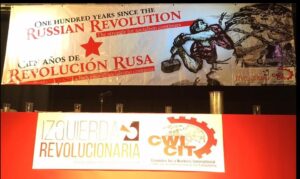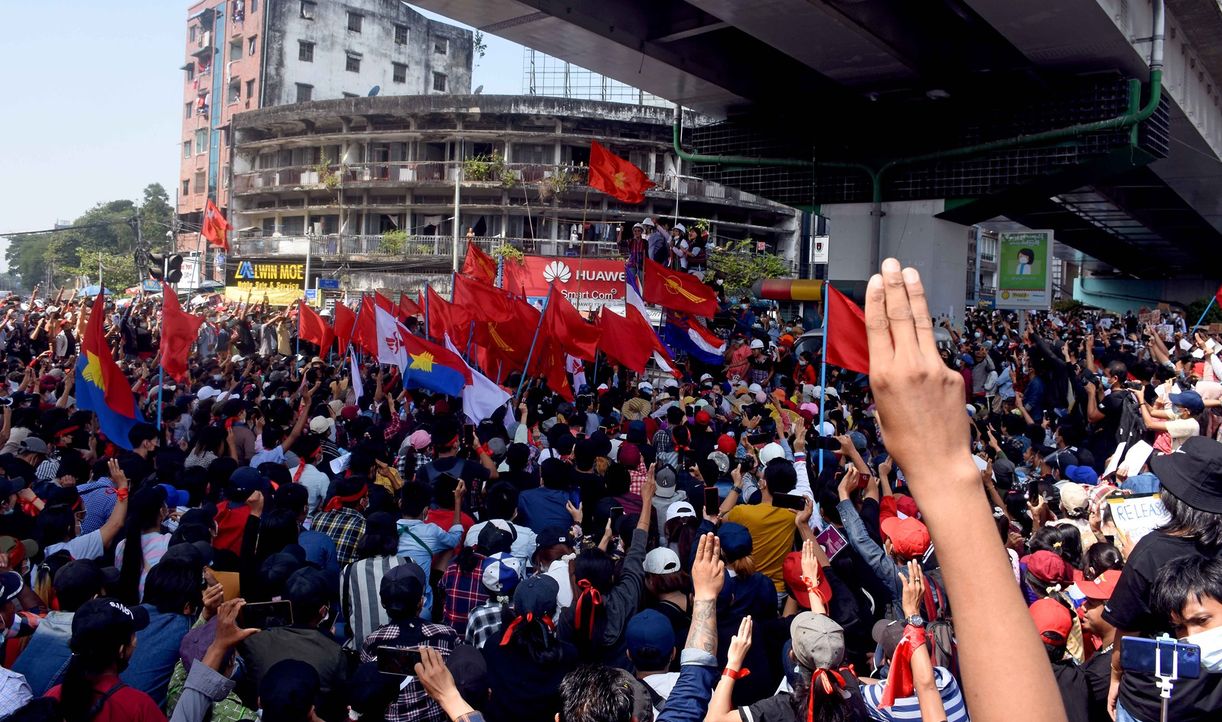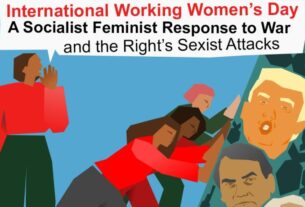 Unanimous vote towards unification with the CWI
Unanimous vote towards unification with the CWI
The congress of Izquierda Revolucionaria (IR) in the Spanish state was held from 13 to 16 April in Madrid. This was the 22nd congress since the organisation of Marxists organised around the paper ‘El Militante’ was founded, but was the most special congress we have held for many years. Almost 200 workers and youth activists from the workers, social movements and student movement participated, from more than 30 cities around the Spanish state. IR comrades from Mexico and Venezuela, as well as members of the CWI’s revolutionary parties in Belgium, Scotland, and Portugal and of the CWI’s International Secretariat attended.
Capitalist crisis and the rise of the class struggle
The discussions of the congress were divided into 4 sessions: International and Spanish perspectives, Marxism and the emancipation of working class women, the process of unification with the CWI and the building of the party – strategy and tactics.
The discussion on perspectives took place from Thursday afternoon until Friday morning. The introduction was divided into two parts. Tony Saunois, from the CWI’s IS was the first speaker, giving a general panorama of the capitalist crisis around the world, the clashed between imperialist powers and the breaking up of the geopolitical equilibrium of the system. He also outlined the rise of the class struggle, and political polarisation, paying special attention to the victory of Trump in the US, Brexit and the events which are developing in France.
He was followed by Juan Ignacio Ramos, IR’s General Secretary, who gave a broad account of the current conjuncture of the class struggle in the Spanish state and the crisis of the regime. He explained the perspectives for Podemos, and the process of realignment of the Left, the hardening of the national question and the new struggles which have arisen against the new “triple alliance” (arrangement between the PP, PSOE and Ciudadanos) and the tasks of Marxists in this period.
The debate which followed touched on all the most important aspects of the political and social situation in the world’s key countries. The war in Syria, the Trump Presidency, the support for socialist ideas in the US, Brexit and perspectives for the EU, elections in France, the experience of the “Left” government in Portugal, events in Greece, the situation in Latin America (Venezuela, Argentina, Brazil, México, etc), the world economy… All these issues and more were debated, together with the concrete situation in Spain, the Left local governments in the biggest cities, the real economic situation and the catastrophic effects of the PP’s policies on workers’ conditions, the fight for a return to combative, working class, militant trade unionism, and the national question in Catalonia and Basque Country.
The reply to the session was given by Danny Byrne from the CWI’s IS. One of the main conclusions of the discussion can be resumed in one idea: that it is now more necessary than ever to build a mass revolutionary organisation capable of channelling the gigantic potential displayed by the working class in the struggle against cuts and austerity.
For the rights of working class women! From the Russian Revolution to today
The social rebellion which is taking place in many countries has places the most oppressed in the front line of the struggle. Millions of women, exploited in work, education, at home, in the streets and sexually are victims of institutionalised social violence which kills thousands, with the indifference of governments and the system.
We dedicated Friday evening’s session to this crucial aspect for the future of the world revolution. Barbara Areal from IR’s EC introduced the discussion. Starting from the experience of the Russian Revolution of 1917 and its legislative and material advances in the liberation of working class women, the discussion went over the work of revolutionary pioneers in this battle such as Alexandra Kollontái, Nadia Krupskaya, Clara Zetkin, Elena Stasova, Konkordia Samoilova. It also dealt with the step backwards which Stalinism represented for women’s liberation and the tasks which we face today to end with this cruel oppression.
The introduction dealt with the essential aspects of the programme of working class, socialist feminism which we defend – the right to free abortion, the struggle against violence against women, against the oppression of the state and the chains which the Catholic Church imposes upon us, and the need to fill the women’s movement with class and revolutionary content. The introduction ended with an emphasis of the task which we have set ourselves in this terrain: the strengthening of Libres y Combativas, the revolutionary, anti-capitalist socialist feminist platform which we have launched together with the Sindicato de Estudiantes.
The debate – with many interventions – went into many aspects. From the massive mobilisations which are taking place around the world in defence of the rights of working class women, to our defence of the movement for LGBTI rights and the struggle against its commodification and the central task of understanding that gender does not eliminate class antagonisms. The interests and aspirations of working class women, their daily suffering, exploitation and oppression has nothing in common with Cospedal, Esperanza Aguirre, Patricia Botín, las Hillary Clinton or Theresa May. The struggle for the emancipation of working class women is totally linked to the fight for a socialist transformation of society.
Building the forces of Marxism
The session on the building of the party was introduced by Carlos Ramirez and replied to by Victor Taibo from the EC of IR. The discussion was full of reports of the interventions and activity of IR, both in the workers’ movement and among the youth, and our steps forward in the last period, in recruiting new members and developing a new layer of cadres. Comrades from Venezuela and Mexico also explained their experiences in these countries. The presence of comrades from various sections of the CWI helped us to deal with the development of the forces of Marxism in other countries, which enriched the debate.
It is necessary to underline the work of the Young militants of IR in the building of the Sindicato de Estudiantes, which has seen spectacular growth in the last period. The struggle waged by the SE in defence of public education forced the government to withdraw one of the worst elements in its reactionary education reform – the francoist “revalidation” exams. The SE’s firmness in struggle also allowed the movement to bypass to a great extent the strategy of demobilisation of the bureaucratic leaderships of the CCOO and UGT unions, as well as the leadership of PSOE, who all wanted to sign an “education pact” to end the mass movement.
The production of Marxist literature through the Frederick Engels Foundation (FFE) was also underlined. The FFE is the most important Spanish language Marxist publishing house in the world at the moment, working to arm the workers movement with a theoretical arsenal at this decisive moment.
Uniting the forces of Marxism
The most intense part of the congress, without doubt, was the session dedicated to the unification of IR with the CWI. Tony Saunois introduced the session with an account of the history of Militant, the revolutionary organisation which battled the right wing Labour Party bureaucracy in the 1970s and 80s, reaching more than 8,000 members in Britain and leading a great battle against Margaret Thatcher. Militant became the Trotskyist organisation with the greatest weight among the working class in Europe, and was the core from which the CWI was developed.
The fall of the USSR and the Stalinist regimes in Eastern Europe was a turning point in contemporary history, and kicked off a ferocious ideological campaign against the ideas of socialism, obliging Marxists to carry out a great theoretical and tactical effort to re-orientate ourselves in an extremely complex situation. This earthquake was the context in which the separation of IR from the CWI took place.
After decades of work on separate paths, our intervention in the class struggle and our analysis of the character of the epoch, and the necessary strategy and tactics for the building of mass Marxist parties, has brought us back together. We are the same organisation with the same methods and analysis and a common past. This is the principled basis on which our reunification – which takes us only a higher level – is taking place.
With great enthusiasm, the delegates and visitors to the congress voted unanimously in favor of the joint declaration towards unification presented by the International Executive Committees of the CWI and IR. This process of unity will culminate in July in Barcelona with a Unification Congress and a public rally to commemorate the Russian Revolution, at which we hope to have over 600 people.
Our confidence in the ideas of Marxism and the capacity of our class to transform society was concretised in the magnificent result of the financial collection which we traditionally carry out at our congresses. The result was historic and surpassed all our expectations.
Over 70 interventions were made into the congress, making it one of the most participative in our history, especially the role played by our female comrades in all of the sessions.
Over the course of the congress, greetings from sections of the CWI in Greece, Belgium, Chile, Portugal, Australia, Germany, the US, Sweden, Brazil, Scotland, England & Wales, Ireland and China were read.
The congress was closed with the singing of the International on Sunday at midday. It was a congress which will lay the basis for a qualitative step forward in the building of the forces of Marxism in Spain and internationally




